Joe Kennedy III, a False Progressive Idol Like JFK
America does not need another elite Kennedy pretending to lead us out of the darkness of authoritarian capitalism, racism, militarism and other evils.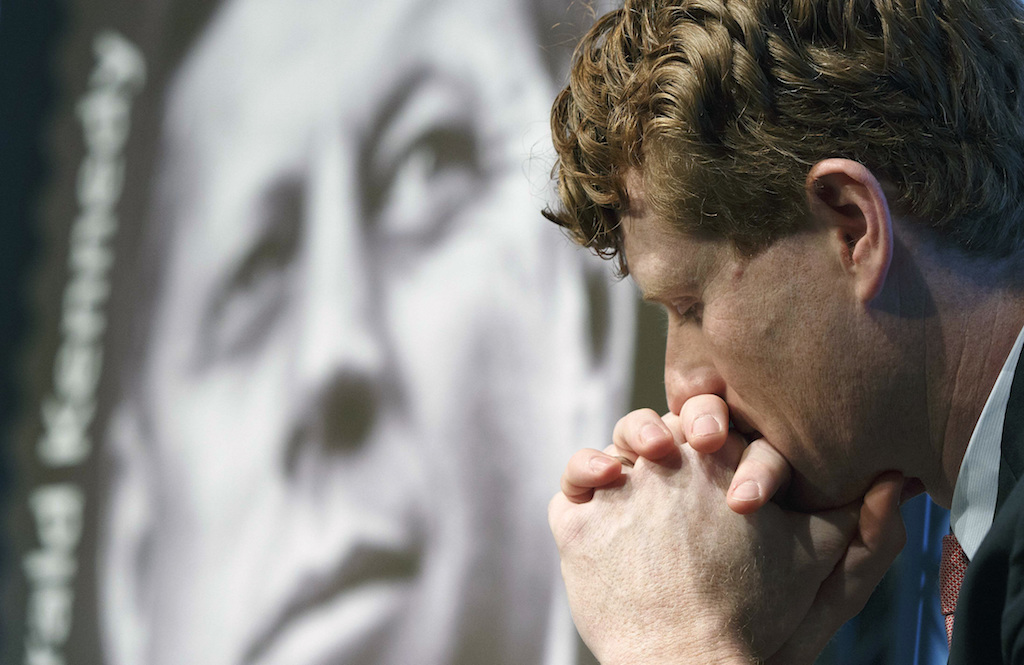 Rep. Joseph P. Kennedy III, D-Mass., at the February 2017 dedication ceremony for the John F. Kennedy Centennial Stamp at the John F. Kennedy Library in Boston. (Michael Dwyer / AP)
Rep. Joseph P. Kennedy III, D-Mass., at the February 2017 dedication ceremony for the John F. Kennedy Centennial Stamp at the John F. Kennedy Library in Boston. (Michael Dwyer / AP)
My first political memory is the assassination of John Fitzgerald Kennedy (JFK). I was 5 years old, home from kindergarten on the afternoon of Nov. 22, 1963. I was in the living room in a small apartment in the liberal, racially integrated neighborhood of Hyde Park on the South Side of Chicago. The television was on because my mother had been watching soap operas on CBS.
After Walter Cronkite announced that Kennedy had been proclaimed dead, I relayed the news to my mother, who was ironing sheets in an adjacent hallway. She burst into tears. My recollection of Kennedy’s death is forever linked to an image of my mother quietly sobbing in a haze of white steam. At my age, I of course had no idea why anyone would weep over Jack Kennedy’s death.
Later it came into focus. My parents were postwar liberal Democrats. Kennedy was something of a hero in my household. My father was a young jazz-piano-playing academic, a sociologist encouraged by Kennedy’s purported cultivation of intellectuals and the arts—a break from the official suspicion in which thinkers and artists had been held during the bleak McCarthy years.
Kennedy was the nation’s first Catholic president, no small matter for my half Irish-Catholic mother. He was identified to some degree with black civil rights, a cause my parents supported. Kennedy had Ivy League credentials, something that appealed to the professional class ideology my parents had absorbed from their middle-class upbringings and higher education.
To complete this mythic picture, the dashing young president and his glamorous wife had telegenic, movie-star charisma and charm, and small children of their own.
That is why my mother broke into tears the afternoon of Nov. 22, 1963.
Sadly, however, my young parents and their generation of smart young liberal Democrats granted JFK far more love and respect than he deserved.
Five and a half decades later, so do liberal Democrats who pine for a new Jack Kennedy in the White House.
But JFK spent the lion’s share of his presidency on the wrong side of each of what Dr. Martin Luther King Jr.—another assassinated 1960s icon with whom Kennedy is often absurdly conflated—called “the triple evils that are interrelated”: racism, economic injustice (capitalism) and militarism. Kennedy is a false progressive idol of the highest order, something you won’t learn about on MSNBC (“MSDNC”), where Democratic Party commentator Chris Matthews lives in a seemingly permanent state of Kennedy family worship.
Let’s start with the second of King’s “triple evils”—class rule. “The role played by twentieth-century Presidents,” political scientist Bruce Miroff noted 42 years ago, “has been characteristically conservative. ‘Liberal’ as well as ‘conservative’ Presidents … have bent their strongest efforts, not to alter, but to preserve America’s dominant institutions. Whatever their professed sympathies, their actions have served, not to redistribute wealth and power, but to perpetuate existing inequalities … [serving as] central figures in the maintenance of established [hierarchical] socioeconomic arrangements.”
As Miroff demonstrated in his forgotten 1976 classic “Pragmatic Illusions: The Presidential Politics of John F. Kennedy,” JFK was no exception to the rule. More than a decade before neoliberal Democrats emerged to explicitly steer the Democratic Party further to the corporate right, JFK’s superficially declared sympathies for the poor and working-class took a back seat in his White House to “the real determinants of policy: political calculation and economic doctrine.”
As Miroff explained, political cunning “led Kennedy to appease the corporate giants and their allies in government.” Economic doctrine “told him that the key to the expansion and health of the economy was the health and expansion of those same corporate giants. The architects of Kennedy’s ‘New Economics’ liked to portray it as the technically sophisticated and politically neutral management of a modern industrial economy. It is more accurately portrayed as a pragmatic liberalism in the service of corporate capitalism.”
The regressive nature of JFK’s “New Economics” was cloaked by his recurrent, much-publicized spats with certain members of the business community (the executives of U.S. Steel above all), his repeated statements of concern for labor and the poor, and his claim to advance a purely “technical” and “pragmatic” economic agenda that elevated “practical management” and administrative expertise above the “grand warfare of ideologies.”
JFK inhabited the same centrist, cautious, cunning and “pragmatic” place on the first of King’s “triple evils”—racism. Kennedy might have found it politically useful to intervene on King’s behalf during the latter’s jailing in the election year of 1960 and, later, to wrap himself in the aura of racial progress and equality by offering some partial and belated federal protections to the civil rights movement (CRM). But the Kennedy administration worked hard to divide and dilute the CRM, seeking to channel it into staid and narrow legal and electoral grooves. The JFK White House gave some elementary shelter to activists and Southern blacks only when the president and his practically co-presidential brother and Attorney General Bobby Kennedy calculated that rabid white Southern reaction was undermining their ability to sell the United States as a model of enlightened “democracy” in its Cold War contest with the Soviet Union for the allegiances of the nonwhite Third World.
Subsequent elitist “Mississippi Burning” revisionism notwithstanding, the Kennedy administration was no great friend of the struggle for black equality. Its response to the black freedom movement was dominated by the tension between two competing political calculations: (1) the threat of politically alienating white Americans, above all traditionally Democratic and white Southerners, and (2) the risk of losing Third World hearts and minds in the supposed U.S. struggle to advance “freedom and democracy.” Kennedy and his brother bent over backward to accommodate Southern racists, leaving them feeling free to kill and maim civil rights activists in the deep South. When the federal Civil Rights Commission announced that it would investigate racist violence in Mississippi, the younger Kennedy denounced the commission as being like the House Un-American Activities Committee “investigating Communism.” When NAACP leader Medgar Evers was shot down in his own driveway, Bobby Kennedy said that it was not the federal government’s job to protect black activists. It was up the state of Mississippi.
The real experience and struggles of black Americans were not an especially relevant concern to the Kennedys. When Southern racist authorities managed to defeat the CRM without politically problematic and embarrassing violence (as in Albany, Ga., in 1962), the Kennedy administration was happy to withhold protection from King and his fellow activists. When racist police commissioner Bull Connor attacked black protesters in Birmingham, Ala., with high-pressure water hoses, dogs and batons in May 1963, JFK complained that the demonstrations were making the U.S. “look bad in the world” and Bobby Kennedy claimed that 90 percent of the protesters had no idea why they were in the streets. Along the way, Kennedy appointed at least five segregationists to the federal judiciary, turning to the racist Mississippi senator, James Eastland, for advice on appointments. The Kennedy brothers were inordinately obsessed with alleged Communist connections to King and the CRM. They approved racist FBI director J. Edgar Hoover’s regular and relentless police state surveillance, smearing and infiltration of the movement.
This ugly Kennedy history would be less surprising to liberal progressives, perhaps, if they would carefully read JFK’s bestselling, Pulitzer Prize-winning 1957 book “Profiles in Courage.” There, Kennedy foretold his coming weak civil rights record, purveying Southern white historical mythology by referring to the Reconstruction era after the Civil War as a “black nightmare … nourished by Federal bayonets.”
(For useful historical accounts of JFK’s less-than-progressive civil rights record, see Harvard Sitkoff’s 2008 book, “The Struggle for Black Equality”; David Garrow’s 2004 book, “Bearing the Cross: Martin Luther King, Jr. and the Southern Christian Leadership Conference”; and Kenneth O’Reilly’s 1995 book, “Nixon’s Piano: Presidents and Racial Politics from Washington to Clinton”).
Turning to King’s third evil, JFK’s foreign policy record was militantly imperial and militarist, contrary to subsequent liberal and left hagiographers’ weird determination to reinvent him as a man of the left. As Noam Chomsky noted in his 1993 study “Rethinking Camelot: JFK, the Vietnam War, and U.S. Political Culture,” “One of the most significant legacies left by the [Kennedy] Administration was its 1962 decision to shift the mission of the [U.S.-funded, equipped, and trained] Latin American military from ‘hemispheric defense’ to ‘internal security’,” leading, in the words of Kennedy’s top Latin American counter-insurgency planner (Charles Maechling) to “direct [U.S.] complicity” in “the methods of Heinrich Himmler’s extermination squads. The shift to deadly internal repression was a natural corollary to Kennedy’s “export-promoting” Alliance for Progress “development program,” which benefited Latin American elites while drastically increasing Latin American unemployment.
When Kennedy was assassinated, the CIA and JFK’s advisers were working with his approval to overthrow a democratically elected government and install a fascist military dictatorship in Brazil. The plan was carried out months later. “Brazil,” Chomsky observed 11 years ago, “had a moderately populist-democratic government in the early 1960s. The Kennedy administration organized a military coup that imposed a neo-Nazi national security state that was the first of the plague that then spread throughout the continent to Chile, Argentina, Central America and then became one big massacre.”
In Cuba, where Washington’s Third World fascist allies had been overthrown and forced to flee after Fidel Castro and Che Guevara led a popular socialist revolution in 1959, the Kennedy administration made repeated attempts to assassinate the nations’ leaders and launched an ongoing campaign of terror and sabotage. After the U.S.-run Bay of Pigs invasion operation that Kennedy inherited from Dwight Eisenhower failed spectacularly in its efforts to spark a rebellion against Castro in April 1961, Kennedy “asked his brother, Attorney General Robert Kennedy,” writes historian Piero Gleijeses, “to lead the top-level interagency group that oversaw Operation Mongoose, a program of paramilitary operations, economic warfare, and sabotage he launched in late 1961 to visit the ‘terrors of the earth’ on Fidel Castro and, more prosaically, to topple him.” This explicit terror campaign included the murder of 400 Cuban factory workers in early November 1962, less than two weeks after the Cuban missile crisis.
Kennedy understood the thoroughly conditional nature of “democracy” as a U.S. foreign policy objective when he remarked that while the U.S. would prefer democratic regimes abroad, it will choose “a [pro-American dictator] Trujillo” over “a [“anti-American” dictator] Castro” if those were the only choices. “It is necessary only to add,” Chomsky observed in 1991, that Kennedy’s “concept of ‘a Castro’ was very broad,” including anyone who challenged U.S. power and global capitalism.
Then there’s Vietnam. Kennedy “raised the level of [U.S.] attack [on Indochina] from international terrorism to outright aggression in 1961-62,” Chomsky said, justifying the use of U.S. airpower to napalm social revolutionaries, defoliate Vietnamese countrysides and slaughter innocent peasants with the false claims that “we are opposed around the world by a monolithic and ruthless [Soviet-Marxist] conspiracy” and that failure to stop “Communism” in Vietnam would open the gates to Soviet world domination. After the epic failure of the CIA’s Bay of Pigs invasion of Cuba and the erection of the Berlin Wall in East Germany, Kennedy told The New York Times’ James Reston in late 1961 that “[n]ow we have a problem in making our [anti-Communist Cold War] power credible, and Vietnam is the place.”
Would Kennedy, as some of his liberal and left fans like Oliver Stone and James K. Galbraith (son of JFK assistant John Kenneth Galbraith) claim, have withdrawn U.S. forces from Vietnam had he not been assassinated in late November of 1963? (Stone even made a blockbuster movie to claim that the supposed peace advocate JFK was murdered by the CIA to permit U.S. escalation in Vietnam under the leadership of Lyndon Johnson, portrayed as an agent of the defense industry and right-wing military officers.). This has been a topic of dispute between and among left and liberal historians and researchers, including Rick Perlstein, Galbraith, Stone and Chomsky. They dispute the significance and meaning of JFK’s apparent October 1963 “decision” and plan to remove U.S. troops from Vietnam by the end of 1965. The winners in the debate are Perlstein and Chomsky, who correctly observe that that Kennedy’s “withdrawal plan” was conditional on full U.S. victory over the Vietnamese revolution and independence movement. It would not have been carried out, given harsh realities on the ground. As Perlstein noted five years ago:
[W]hether John F. Kennedy’s formal decision would be carried through in the interim between October 1963 and January 1966 was contingent on what happened in the future. One day this summer I issued a formal decision to go the beach. Then it rained. And so I did not go to the beach. … And as anyone who knows anything about the Vietnam War knows, the people funneling intelligence to the president were alarmingly adept (‘the military phase of the war can be virtually won in 1963’) at claiming the sun was shining when it actually was pouring down rain. In fact, when it came to America’s military prospects there, it was winter in Seattle just about all the time.
JFK’s late-in-life public statements were consistent with Chomsky and Perlstein’s sense that the doomed young president had no intention of pulling back from his mass-murderous assault on Vietnam until U.S “victory” was attained. In Fort Worth, just hours before the assassination, for example, Kennedy said that “without the United States, South Vietnam would collapse overnight.” In the speech he would have delivered in Dallas, Kennedy was going to say that the U.S., in its role as “watchman on the walls of world freedom,” had to carry out duties that were “painful, risky and costly, as is true in Southeast Asia today. But we dare not weary of the task.” In repeated public statements in the summer and early fall of 1963, Kennedy left no doubt that for him, withdrawal without “victory” was unthinkable.
Even if Kennedy had survived and removed U.S. forces from Vietnam, this would have meant only that JFK had decided that U.S.-trained and U.S.-equipped South Vietnamese troops and the U.S.-funded regime of South Vietnam were capable of defeating the Vietnamese revolution without the further engagement of U.S. troops—on the model, say, of the mass-murderous U.S.-backed Suharto government in Indonesia.
The most nauseating claim made by members of the liberal Jack Kennedy cult holds that JFK heroically saved humanity from nuclear annihilation during the Cuban missile crisis of October 1962. I have already shown in previous Truthdig columns (see my essay “The Cuban Missile Crisis vs. the Korean Missile Crisis” from August 2017) that the truth is precisely the opposite. “In effect,” the British journalist Joseph Richardson noted five years ago in an article properly titled “JFK’s Lunatic Priorities During the Cuban Missile Crisis,” “Kennedy’s government was prepared to risk a nuclear conflagration to safeguard US prestige. [Kennedy’s] Secretary of State Dean Rusk jubilantly exclaimed after the first Soviet ships opted not to run the American blockade that ‘we’re eye ball to eye ball and I think the other fellow just blinked.’
Had the Soviets not blinked, it is likely Rusk would not have been around to give his reaction.” But for Soviet Premier Nikita Khrushchev’s determination to let humanity survive and the heroic intervention of a Soviet submarine commander named Vasili Arkhipov beneath the Western Atlantic in the early evening of Oct. 27, 1962, it seems likely that Kennedy’s reckless naval blockade and nuclear machismo would have set off World War III. At the same time, Kennedy set the stage for the Strangelovian “one minute to midnight” moment by dramatically escalating the international arms race and with his incursions into Cuba, which provoked Castro into seeking a Soviet nuclear shield against U.S. invasion.
Despite all this and more, JFK still maintains a strange reputation as an agent of peace and social justice among certain persistently star-struck people of “the left.” I get emails from readers who see the assassination of JFK in the same light as they see the murder of Dr. King—as if both martyrs were great people’s leaders fighting heroically for racial equality, social justice and peace. They speak of Kennedy’s assassination as his “martyrdom for peace.”
Just three days ago, an anti-war peace environmentalist wrote me via social media to protest the “eras[ure] of” what she called “the real legacy of JFK … which was that he may have saved the world from nuclear annihilation during the Cuban Missile Crisis—and he wanted PEACE.” She insists that I read Catholic Worker James Douglass’ 2008 book “JFK and the Unspeakable,” which purports to show that Kennedy was killed by the CIA and its military-industrial allies because he had decided to switch from being a man of empire to being a man of peace. As the “Unrepentant Marxist” Louis Proyect noted in a sharp 2005 reflection on JFK’s undeserved progressive standing, “Despite its obvious futility, the search for enlightened bourgeois leadership seems never-ending.”
The real history that makes the equation of Jack Kennedy and Dr. King preposterous and indeed Orwellian is worth keeping in mind in light of the Democratic Party’s recent ham-fisted attempt to rewrap itself in the flag of the Kennedy mystique by having Bobby Kennedy’s 37-year-old grandson (and JFK’s grandnephew), Congressman Joseph Kennedy III, D-Mass., give the neoliberal Democrats’ televised response to Donald Trump’s first State of the Union Address. As Politico explained before the address, “Tapping [Joe] Kennedy [III] is … notable because he represents a younger wave of Democrats in a party that is sometimes criticized for its cadre of older leaders and potential 2020 presidential candidates, all in their 70s.”
It was about more than age alone. The Democratic Party’s neoliberal corporate and imperial “elite” is concerned about the attraction that the anti-plutocratic and social-democratish Scandinavia-praising progressivism of Bernie Sanders has understandably had for younger Democratic voters. Could the young Kennedy be a new outwardly progressive-seeming but in fact corporate and Wall Street-friendly knight in shining dynastic armor? Is his job to keep excessively left-leaning young voters on board with the dismal, dollar-drenched inauthentic opposition party of wealth- and power-serving Wall Street- and Silicon Valley- and “defense” industry-captive Democrats like Hillary Clinton, Barack Obama, Charles Schumer and Nancy “we’re capitalist and that’s just the way it is” Pelosi?
The young and obscenely wealthy young congressman (with a net worth of $43.2 million) is a single-payer opponent whose top donors include the global investment firm Crescent Capital, Bank of America, Raytheon, and Bain Capital. Glenn Greenwald tweeted with dark irony about the Joe Kennedy speaking assignment: “Good to see Democrats trying something new: it’s been 13 whole months since they ran a very rich candidate with deep Wall Street and corporate ties from a famous political family. Maybe it’ll work this time.”
Thankfully, perhaps, the only thing that shined in Congressman Kennedy’s badly delivered, high-school-level speech—a transparent and botched attempt to mimic Barack Obama’s keynote address at the 2004 Democratic National Convention—was the glaring lip balm that gleamed at the corners of his mouth, earning him designation as the victim and perpetrator of “#Chapstickaquiddick.”
We don’t need another hyper-opulent, outwardly liberal pseudo-progressive, Harvard-minted Kennedy to pretend to lead us out of the darkness of authoritarian capitalism, racism, militarism, empire, patriarchy and ecocide. We could, however, use another Dr. King and another great social justice and peace moment like the one King and his cohorts formed and led beneath and beyond the U.S. election cycle in the 1950s and 1960s.
Your support is crucial...As we navigate an uncertain 2025, with a new administration questioning press freedoms, the risks are clear: our ability to report freely is under threat.
Your tax-deductible donation enables us to dig deeper, delivering fearless investigative reporting and analysis that exposes the reality beneath the headlines — without compromise.
Now is the time to take action. Stand with our courageous journalists. Donate today to protect a free press, uphold democracy and uncover the stories that need to be told.

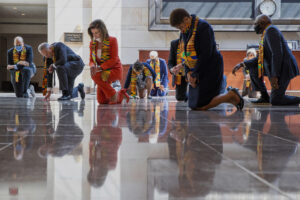
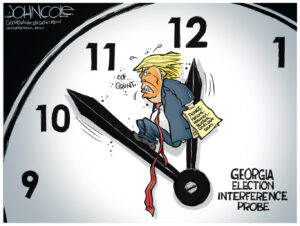
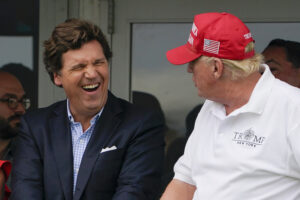
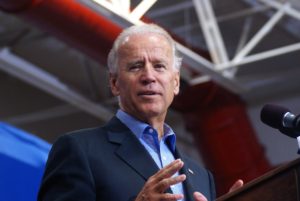
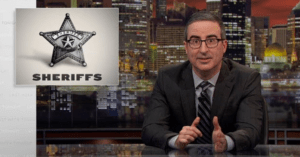
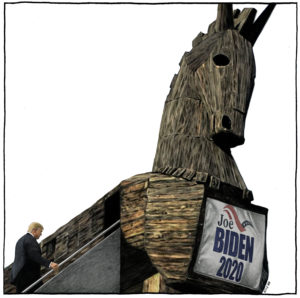
You need to be a supporter to comment.
There are currently no responses to this article.
Be the first to respond.